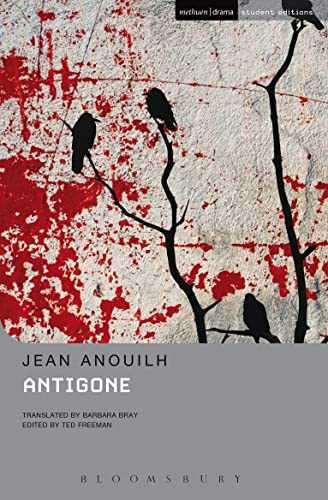
Inhaltsangabe
'Anouilh is a poet, but not of words: he is a poet of words-acted, of scenes-set, of players-performing' Peter Brook Jean Anouilh, one of the foremost French playwrights of the twentieth century, replaced the mundane realist works of the previous era with his innovative dramas, which exploit fantasy, tragic passion, scenic poetry and cosmic leaps in time and space. Antigone, his best-known play, was performed in 1944 in Nazi-controlled Paris and provoked fierce controversy. In defying the tyrant Creon and going to her death, Antigone conveyed to Anouilh's compatriots a covert message of heroic resistance; but the author's characterisaation of Creon also seemed to exonerate Marshal Petain and his fellow collaborators. More ambivalent than his ancient model, Sophocles, Anouilh uses Greek myth to explore the disturbing moral dilemmas of our times. Commentary and notes by Ted Freeman.
Die Inhaltsangabe kann sich auf eine andere Ausgabe dieses Titels beziehen.
Über die Autorin bzw. den Autor
Jean Anouilh was born in Bordeaux in 1910. He studied law briefly at the Sorbonne and then became a copywriter for an advertising agency. In 1931 he became secretary to the actor-manager, Louis Jouvet, and his first play, The Ermine, was staged the following year. Antigone firmly established his popularity in France in 1944, and Peter Brook's 1950 production of Ring Round the Moon in Christopher Fry's translation made his name in England. His best-known plays are: Restless Heart (1934); Dinner with the Family, Traveller without Luggage (both 1937); Thieves' Carnival (1938); Léocadia (1939); Point of Departure (Eurydice) (1941); Romeo and Jeannette (1945); Medea (1946); Ardèle (1948); The Rehearsal (1950); Colombe (1951); The Waltz of the Toreadors (1952); The Lark (1953); Ornifle (1955); Poor Bitos (1956); Becket (1956); The Fighting Cock (1966); Dear Antoine (1971); The Director of the Opera (1973); Number One (1981). Twice married, he lived mainly in Switzerland for the last thirty years of his life. Anouilh died in 1987.
Von der hinteren Coverseite
'Anouilh is a poet, but not of words: he is a poet of words-acted, of scenes-set, of players-performing' Peter Brook Jean Anouilh, one of the foremost French playwrights of the twentieth century, replaced the mundane realist works of the previous era with his innovative dramas, which exploit fantasy, tragic passion, scenic poetry and cosmic leaps in time and space. Antigone, his best-known play, was performed in 1944 in Nazi-controlled Paris and provoked fierce controversy. In defying the tyrant Creon and going to her death, Antigone conveyed to Anouilh's compatriots a covert message of heroic resistance; but the author's characterisaation of Creon also seemed to exonerate Marshal Petain and his fellow collaborators. More ambivalent than his ancient model, Sophocles, Anouilh uses Greek myth to explore the disturbing moral dilemmas of our times. Commentary and notes by Ted Freeman.
„Über diesen Titel“ kann sich auf eine andere Ausgabe dieses Titels beziehen.
Weitere beliebte Ausgaben desselben Titels
Suchergebnisse für Antigone: Jean Anouilh (Student Editions)
Antigone
Anbieter: ThriftBooks-Atlanta, AUSTELL, GA, USA
Paperback. Zustand: Fair. No Jacket. Readable copy. Pages may have considerable notes/highlighting. ~ ThriftBooks: Read More, Spend Less. Artikel-Nr. G0413695409I5N00
Antigone
Anbieter: ThriftBooks-Reno, Reno, NV, USA
Paperback. Zustand: Good. No Jacket. Pages can have notes/highlighting. Spine may show signs of wear. ~ ThriftBooks: Read More, Spend Less. Artikel-Nr. G0413695409I3N00
Antigone
Anbieter: ThriftBooks-Atlanta, AUSTELL, GA, USA
Paperback. Zustand: Good. No Jacket. Pages can have notes/highlighting. Spine may show signs of wear. ~ ThriftBooks: Read More, Spend Less. Artikel-Nr. G0413695409I3N00
Antigone
Anbieter: ThriftBooks-Phoenix, Phoenix, AZ, USA
Paperback. Zustand: Good. No Jacket. Pages can have notes/highlighting. Spine may show signs of wear. ~ ThriftBooks: Read More, Spend Less. Artikel-Nr. G0413695409I3N00
Antigone
Anbieter: ThriftBooks-Dallas, Dallas, TX, USA
Paperback. Zustand: Good. No Jacket. Pages can have notes/highlighting. Spine may show signs of wear. ~ ThriftBooks: Read More, Spend Less. Artikel-Nr. G0413695409I3N00
Antigone
Anbieter: ThriftBooks-Atlanta, AUSTELL, GA, USA
Paperback. Zustand: Good. No Jacket. Former library book; Pages can have notes/highlighting. Spine may show signs of wear. ~ ThriftBooks: Read More, Spend Less. Artikel-Nr. G0413695409I3N10
Antigone: Methuen Student Editions
Anbieter: Better World Books: West, Reno, NV, USA
Zustand: Good. Former library book; may include library markings. Used book that is in clean, average condition without any missing pages. Artikel-Nr. 5994369-6
Antigone: Methuen Student Editions
Anbieter: Better World Books, Mishawaka, IN, USA
Zustand: Good. Used book that is in clean, average condition without any missing pages. Artikel-Nr. 4279408-6
Antigone (Methuen Drama, Methuen Student Edition)
Anbieter: Wonder Book, Frederick, MD, USA
Zustand: Good. Good condition. A copy that has been read but remains intact. May contain markings such as bookplates, stamps, limited notes and highlighting, or a few light stains. Artikel-Nr. H21C-02732
Antigone (Methuen Drama, Methuen Student Edition)
Anbieter: Wonder Book, Frederick, MD, USA
Zustand: Very Good. Very Good condition. With remainder mark. A copy that may have a few cosmetic defects. May also contain light spine creasing or a few markings such as an owner's name, short gifter's inscription or light stamp. Artikel-Nr. R03B-03963

